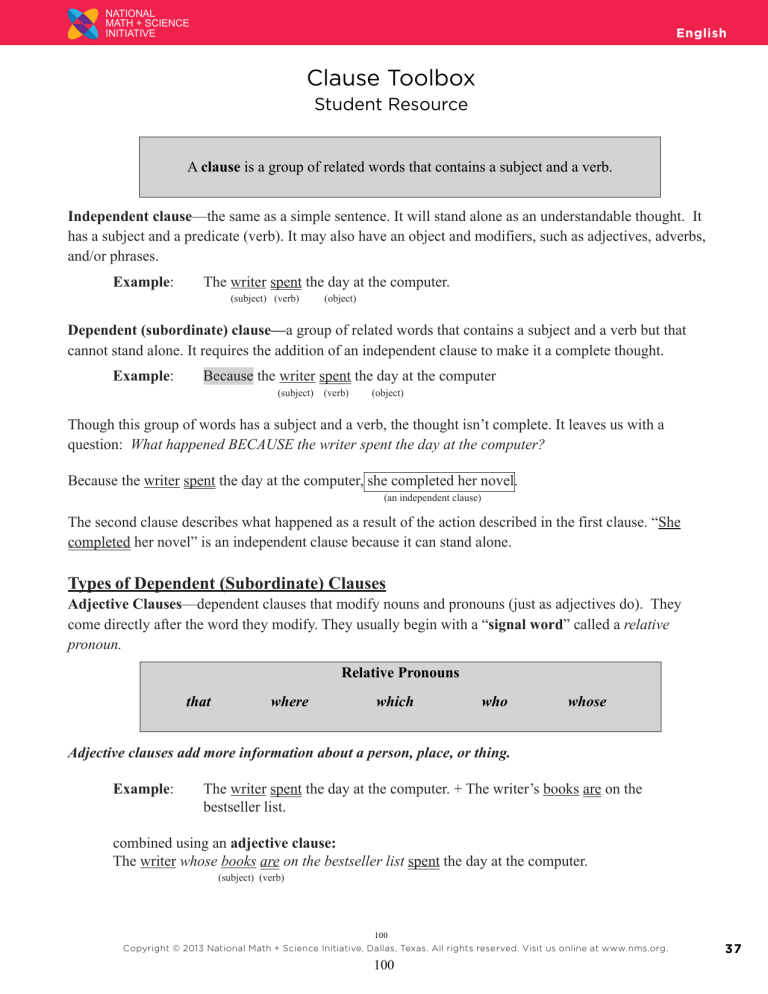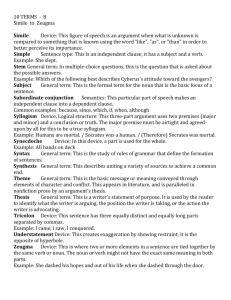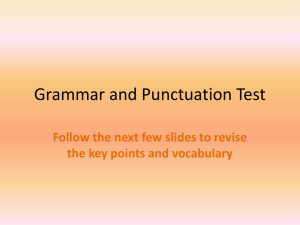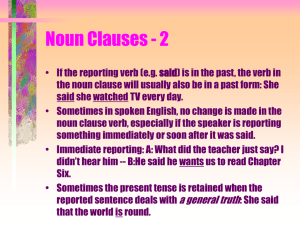
NATIONAL MATH + SCIENCE INITIATIVE English Clause Toolbox Student Resource A clause is a group of related words that contains a subject and a verb. Independent clause—the same as a simple sentence. It will stand alone as an understandable thought. It has a subject and a predicate (verb). It may also have an object and modifiers, such as adjectives, adverbs, and/or phrases. Example: The writer spent the day at the computer. (subject) (verb) (object) Dependent (subordinate) clause—a group of related words that contains a subject and a verb but that cannot stand alone. It requires the addition of an independent clause to make it a complete thought. Example: Because the writer spent the day at the computer (subject) (verb) (object) Though this group of words has a subject and a verb, the thought isn’t complete. It leaves us with a question: What happened BECAUSE the writer spent the day at the computer? Because the writer spent the day at the computer, she completed her novel. (an independent clause) The second clause describes what happened as a result of the action described in the first clause. “She completed her novel” is an independent clause because it can stand alone. Types of Dependent (Subordinate) Clauses Adjective Clauses—dependent clauses that modify nouns and pronouns (just as adjectives do). They come directly after the word they modify. They usually begin with a “signal word” called a relative pronoun. Relative Pronouns that where which who whose Adjective clauses add more information about a person, place, or thing. Example: The writer spent the day at the computer. + The writer’s books are on the bestseller list. combined using an adjective clause: The writer whose books are on the bestseller list spent the day at the computer. (subject) (verb) 100 Copyright © 2013 National Math + Science Initiative, Dallas, Texas. All rights reserved. Visit us online at www.nms.org. 100 37 English—Clause Toolbox Adverb clauses—dependent clauses that give more details about the rest of the sentence, such as time, cause and effect, conditions, or contrast. Adverb clauses can occur anywhere in the sentence: at the beginning, between the subject and the verb, or at the end of the sentence. They usually begin with a “signal word” called a subordinating conjunction: TIME after before when while as whenever since until as soon as as long as once CAUSE AND EFFECT CONDITION if unless whether even if providing that in case (of, that) in the event (of, that) because since now that as as long as so so that in order that CONTRAST although even though though whereas while Adverb clauses are used to add more information. Example: The writer spent the day at the computer. If we want to know more about the time, we choose a subordinating conjunction from the TIME box above. After the writer spent the day at the computer, she was very tired. If we want to know more about a cause and effect, we choose a subordinating conjunction from the CAUSE AND EFFECT box above. Because the writer spent the day at the computer, she finished her novel. If we want to know more about a condition, we choose a subordinating conjunction from the CONDITION box above. Unless the writer spent the day at the computer, she wouldn’t be able to finish her novel. If we want to know more about a contrast, we choose a subordinating conjunction from the CONTRAST box above. Although the writer spent the day at the computer, she really wanted to be at the park. Note: Although all of these clauses occur at the beginning of the sentence, they could be moved to the end of the sentence. 38 Copyright © 2013 National Math + Science Initiative, Dallas, Texas. All rights reserved. Visit us online at www.nms.org. 101 101 English—Clause Toolbox Noun clauses—dependent clauses that function like a single noun in a sentence. They can be subjects, objects, or complements. The “signal words” for noun clauses are how however if that* what whether whatever when whenever where wherever which whichever who whoever whom whomever whose why Noun clause as the subject of a sentence: Whatever you want for dinner is fine with me. Noun clause as the object of a sentence: John will make whatever you want for dinner. Noun clause as the object of a preposition: I have dinner ready for whoever wants to eat. Noun clauses can also function as: indirect objects, subject complements, adjective complements. *In a noun clause, if the signal word “that” is not the first word of the sentence, it can be omitted. Example: I see (that) you made homemade cookies. (The sentence makes sense with or without “that.”) Copyright © 2013 National Math + Science Initiative, Dallas, Texas. All rights reserved. Visit us online at www.nms.org. 102 102 39





